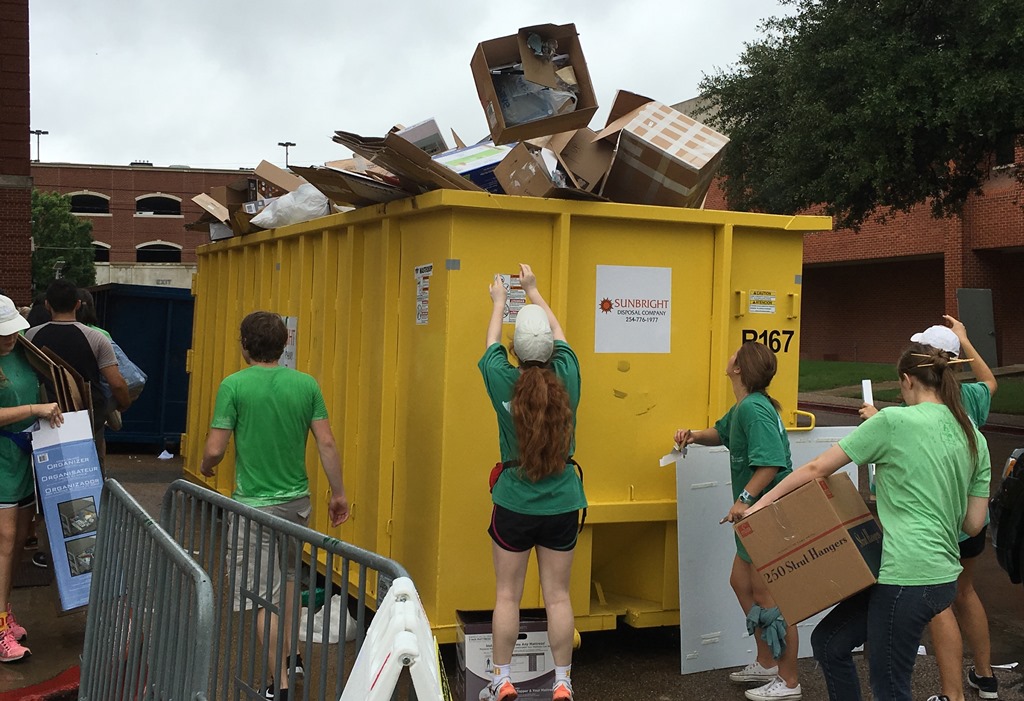Baylor Receives Third ‘Cool Schools’ Designation for Campus Sustainability Practices

Cardboard boxes are broken down and recycled by volunteers during Move-in Days, one of the sustainable efforts at Baylor. (Photo by Smith Getterman)
Media Contact: Lori Fogleman, 254-710-6275
Follow Lori on Twitter at @LoriBaylorU Follow Baylor Media Communications on Twitter: @BaylorUMedia
WACO, Texas (Sept. 9, 2016) – Baylor University’s ongoing commitment to sustainability has been honored for the third time by the Sierra Club, which has named the university to its 2016 “Cool Schools” list.
Baylor is one of eight universities from Texas (Rice, University of Texas at Austin, Texas A&M, UT-Arlington, Texas Tech, UT-Rio Grande Valley, UT-Dallas and University of Houston) and one of three Big 12 Conference schools among the 201 four-colleges and universities honored for their campus sustainability practices.
To determine the rankings, the Sierra Club collaborates with the Association for the Association for the Advancement of Sustainability in Higher Education (AASHE) to use raw data from AASHE’s STARS Reporting Tool, which gives colleges and universities a method for tracking and assessing their sustainability programs and scores the data across 64 questions. This year’s scoring methodology was updated to reflect trends in campus sustainability, with emphasis on energy and transportation.
“What an honor it is, to be named among the most environmentally friendly colleges and universities in the country,” said Smith Getterman, assistant director of sustainability and special projects at Baylor. “This is the result of the hard work and dedication of our faculty, staff, students and even alumni. It’s a testament to the fact that Baylor, as a Christian institution of higher education, takes our role very seriously as we work to be better stewards of our resources today and educate the leaders of tomorrow to do the same, wherever they go.”
Over the past year, Baylor has taken a number of steps toward achieving the goals set forth in Sustainable 2020. The five-year plan, announced in April 2015, focuses on improving new levels of success in the stewardship of University resources in the areas of dining, waste, energy and water by 2020. Below are updates on these five-year goals:
- Dining: 2020 Goal – 20 percent locally sourced food in residence hall cafeterias
- 2015 Update: Locally sourced food in residence hall cafeterias increased to 11.9 percent.
- 2015 Update: University diversion rate, which is the amount of waste kept from the landfill, increased to 21 percent, from a 2010 FY baseline.
- 2015 Update: Use of electric energy decreased by 9 percent, from a 2010 FY baseline.
- 2015 Update: University-wide water use decreased by 20 percent overall, from a 2010 FY baseline.
Waste: 2020 Goal – 30 percent diversion rate
Energy: 2020 Goal – Reduce university greenhouse gas emissions 15 percent by 2020 from a 2010 FY baseline, including growth in university physical space and population
Water: 2020 Goal – Reduce university-wide water use 17 percent by 2020 from a 2010 FY baseline
Getterman pointed out some specific successes last year, including 41,392 pounds of goods collected from students moving out of residence halls and apartments in May and donated to local nonprofits.
In addition, Campus Living & Learning recycled 368 mattresses from residence halls instead of sending them to landfills. Baylor uses a nationwide furniture and mattress recycling company to recycle mattresses. Much of the steel wire used to make mattress inner-springs and box-springs is made from recycled scrap steel. Once the mattress is discarded, the steel wire can again be melted and poured into new steel products such as nuts and screws. The cotton and foam from the recycled mattresses are later used for insulation and foam padding used underneath wall-to-wall carpets and in other cushioning applications.
The Sierra Club says its rankings serve as a guide for prospective students, current students, administrators and alumni to compare colleges’ commitments to sustainability. “It also serves to spur healthy competition among schools, raise environmental standards on campus and publicly reward the institutions that work hard to protect the planet,” the organization said on its website.
For more information, contact Getterman at 254-710-3768 or Smith_Getterman@baylor.edu or visit the Office of Sustainability at Baylor.
ABOUT BAYLOR UNIVERSITY
Baylor University is a private Christian University and a nationally ranked research institution. The University provides a vibrant campus community for more than 16,000 students by blending interdisciplinary research with an international reputation for educational excellence and a faculty commitment to teaching and scholarship. Chartered in 1845 by the Republic of Texas through the efforts of Baptist pioneers, Baylor is the oldest continually operating University in Texas. Located in Waco, Baylor welcomes students from all 50 states and more than 80 countries to study a broad range of degrees among its 12 nationally recognized academic divisions.